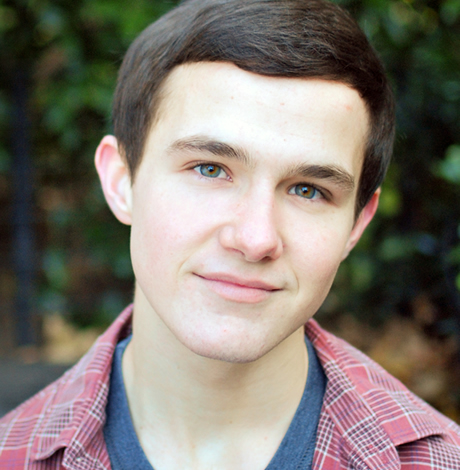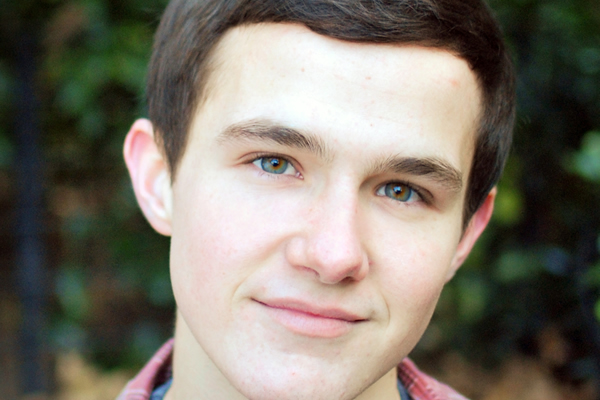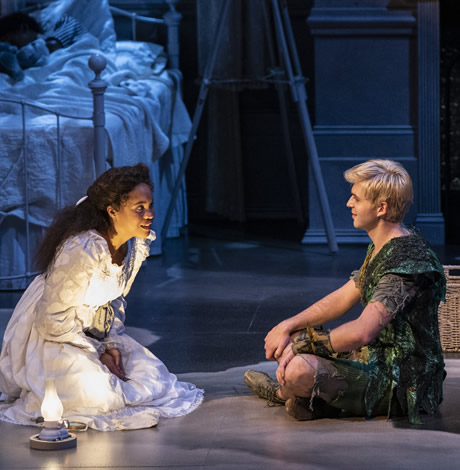Theater
A pirate on tour
Elaborate video brings classic tale to life


Andreas Wyder hopes Broadway and marriage are in his future. (Photo courtesy Center Stage Marketing)
Through Aug. 16
Tysons Corner Center
8200 Watson Street, McLean, Va.
$25 and up
800-745-3000
Since he was little, out actor Andreas Wyder has loved Peter Pan, the boy who wouldn’t grow up. He’s read the original J.M. Barrie story and has seen the Disney animated classic, the various related films and most recently NBC’s live production. And now he’s playing one of Captain Hook’s pirates in a high tech version of the beloved tale in Tysons Corner Center.
Adapted from Barrie’s book, this “Peter Pan” is a play with music but what makes the production unique is it’s performed in the round in a 1,500-seat theater/tent with 360-degree video backdrops for most of the scenery.
“Both the cast and audience are transported to a virtual world. It’s like being inside a very high quality video game,” Wyder says. “We fly over the rooftops of London, across water and into the forests of Neverland. Sometimes you forget where you are.”
At just 21, Wyder is an actor with options. He passed up a more lucrative gig to tour with “Peter Pan” throughout the end of the year. The prospect of living in Neverland for a while, he says, was just too good to refuse.
But playing menacing pirate Bill Jukes wasn’t an easy fit for Wyder.
“Usually I play the bright-eyed hopeful young character. That’s easy for me it’s kind of my natural demeanor. When I auditioned for ‘Peter Pan,’ I read for the lost boys and did the lost boys’ dance, so I was really surprised to learn that I’d been cast as a pirate. Initially, I was a little intimidated; the other pirates are tall with beards. I’m short and don’t seem as threatening. But I’m pretty muscly so I have that going for me.”
Unlike most tours that make weeklong stops in different cities and towns, this production’s complicated tent assembly process calls for longer stays. (“Peter Pan” at Tysons Corner Center runs through mid-August.)
A veteran of national tours including “Titanic: the Musical” and “How the Grinch Stole Christmas: the Musical” in which he played “young Max,” the Grinch’s dog, Wyder says he likes the nomadic life. He loves seeing the country and exploring venues along the way both historic gems and new, high-tech marvels alike.
During his two-year national tour with “Grinch,” Wyder created and hosted the popular video-blog “Puppy Tales” (found on BroadwayWorld.com/YouTube), documenting backstage life with a traveling show. “It gave me an opportunity to give viewers a peek behind the curtain and allowed me to answer questions I’d received via social media. I was surprised but pleased by the blog’s success. I was able to further connect with people and that’s what theater is all about.”
But touring puts stress on a relationship, admits Wyder who when not on the road lives in New York’s Harlem with his boyfriend of two-and-a-half years, also an actor.
“We met during the tour of ‘Titanic,’ so he understands how it works. But it’s hard. You really only have that phone call at the end of the day. Still, I’m ambitious to a fault. I love my career and he knows if I book a tour, I’ll take the job.”
A native of small-town Farmington, Maine, Wyder knew he wanted to act since age 3 when he saw the musical “Cats” on public television. His parents, both educators, supported the dream. He took voices lessons and did community theater and some professional gigs in Maine before decamping to New York City at 17. He’s worked uninterruptedly ever since.
The youngest of four children, he came out to friends and family in middle school. While the revelation didn’t cause major upset it wasn’t altogether easy either.
“My mom is super Catholic. But we ended up not fighting because we love each other so much. When you’re not on the same page, it’s better to choose to love.”
Wyder’s immediate goal is Broadway: “It’s time already. It’s the next logical, happy step. And while it’s cheesy I know, but because I’m this short tenor guy, I’d love to play Boq the munchkin in ‘Wicked.’”
Recently Wyder received an invitation to audition for TV’s American Idol. Because he’s on tour, he’ll do a SKYPE audition for the producers sometime in July.
“It’s sort of a silly dream, but I’d love to be a pop star. And if that puts me on Broadway, I’ll take it.”
His personal aspirations include marriage — one day.
“I’ve got it all planned out. It’s going to be really adorable. The playlist will definitely include Sara Bareilles’ ‘I Choose You.’ Have you heard it? It’ll make you cry.”
But for now, he’s content to play in Neverland.

‘Uncle Vanya’
Through April 20
Shakespeare Theatre Company
Harman Hall
610 F St., N.W.
Shakespearetheatre.org
Shakespeare Theatre Company’s “Uncle Vanya” freshly rendered by director Simon Godwin and starring Hugh Bonneville in the title role, puts a pleasing twist on Chekhov’s tragicomic classic.
As disheveled, disheartened, and overworked Vanya, Bonneville is terrific. Though very different from the actor’s fame making role as Downton Abbey’s Lord Grantham, a proud, fastidiously turned-out aristocrat who presides over a manicured country estate peopled by a large staff, his Vanya is equally compelling
For “Uncle Vanya,” Chekhov imagines a house on a ragged estate in the Russian forest whose inhabitants display varying degrees of discontent brought on by the realization that they’re leading wasted lives. Middle-aged Vanya’s dissatisfaction and disappointment have been tempered by years of hard work. But all of that is about to be challenged.
With his plain and steadfast niece Sonya (Melanie Field), Vanya keeps the place going. And while barely putting aside a kopek for himself, he’s ensured that proceeds have gone to Sonya’s father Alexandre, a querulous academic (Tom Nelis), and his alluring, much younger second wife Yelena (Ito Aghayere) who live in the city.
When called to retire, the self-important professor and his wife economize by joining the family in the country. Overcome by the intense boredom brought on by provincial isolation, they’re not happy. Turns out, life in the sticks isn’t for them.
At the same time, the urban couple’s presence generates quite an effect on the rural household, changing the mood from one of regular work to idleness. What’s more, Vanya and family friend Mikhaíl Ástrov (John Benjamin Hickey), an unusually eco-aware, country doctor, are both bewitched by Yelena.
Meanwhile, young Sonya, who’s long carried an unrequited torch for Ástrov grows increasingly smitten. And while Yelena, who’s bored with her aging husband, expresses teasing tenderness with Vanya, she feels something more serious for Ástrov. It’s a whole lot for one house.
Superbly staged by Simon Godwin, STC’s artistic director, and performed by a topnotch cast, the very human production begins on an unfinished stage cluttered with costume racks and assorted props, all assembled by crew in black and actors in street clothes. We first see them arranging pillows and rugs for an outside scene. Throughout the play, the actors continue to assist with set changes accompanied by an underscore of melancholic cello strings.
With each subsequent scene, the work moves deeper into Chekhov’s late 19th century Russian world from the kitchen to the drawing room thanks in part to scenic designer Robert Brill’s subtle sets and Susan Hilferty and Heather C. Freedman’s period costumes as well as Jen Schriever’s emotive lighting design.
In moments of stillness, the set with its painterly muted tones and spare furnishings is a domestic interior from a moment in time. It’s really something.
Adapted by contemporary Irish playwright Conor McPherson, the work is infused with mordant wit, ribald comedy, and sadness. Like McPherson’s 2006 play “The Seafarer” in which the action unfolds among family, friends and others in a modest house filled with confrontation, laughter, resentment, and sadness. All on brand.
For much of “Uncle Vanya,” McPherson’s script leans into humor, funny slights, the professor’s pretentions, and Vanya’s delicious snarky asides; but after the interval, the play’s stakes become perilously heightened ready to explode with resentment and feelings of wasted potential, particularly frustrations expressed by Vanya and his intelligent but unfulfilled mother (Sharon Lockwood).
When it appears that mismatched couple Alexandre and Yelena are poised to depart, the house is struck with a sense of both relief and gloom.
Not everyone is disturbed. In fact, the family’s old nanny Nana (Nancy Robinette), and Waffles (Craig Wallace), a former landowner and now lodger on the estate, are elated. Both are eager to return to the pre-professor schedule of an early breakfast and midday lunch, and menus featuring simpler fare. They long for the return of the humble Russian noodle.
“Uncle Vanya”melds cynicism and hope. Like life, it’s a grasp at fulfillment.
Theater
Out actor Ángel Lozado on his new role in ‘In the Heights’
Lin-Manuel Miranda’s musical at Signature Theatre through May 4

‘In the Heights’
Through May 4
Signature Theatre
4200 Campbell Ave., Arlington, VA
Tickets start at $40
Sigtheatre.org
Before his smash hit “Hamilton” transformed Broadway, Lin-Manuel Miranda wrote “In the Heights,” a seminal musical set in an upper Manhattan barrio. Infused with hip-hop, rap, and pop ballads, the romance/dramedy unfolds over a lively few days in the well-known Latin neighborhood, Washington Heights.
Now playing at Signature Theatre in Arlington, “In the Heights” features handsome out actor Ángel Lozado as the show’s protagonist Usnavi de la Vega (named for a U.S. Navy vessel), a young Dominican American bodega owner who figures warmly in the center of the hood and the action.
A durable part that Lozado has wanted to play for some time, it’s proved the perfect vehicle to showcase his talents in a story that rings true to his heart.
WASHINGTON BLADE: Timing is very important to you.
ÁNGEL LOZADO: During rehearsal at Signature, our director James Vásquez said “In the Heights” finds you at a time when you need it. And that definitely resonates with me.
In the past I was up for Usnavi several times and then I was standby in the part for two weeks at the Muny in St. Louis but never called to go on.
And then, I lost my grandmother in January and was cast at Signature. In the show, the neighborhood loses their abuela [played by Rayanne Gonzales], I feel like I was meant to play the part at this moment. I’m a firm believer in the timing of it all.
BLADE: You’ve trained vocally at Florida State University, debuted on Broadway in “Bad Cinderella,” sang in “Jesus Christ Superstar Live (NBC),” and sung in many other musicals, but I’m guessing this is different?
LOZADO: Rapping is the most challenging part of the role. I’m trained in musical theater. I can sustain eight shows a week, but this is different. Rapping is more taxing. It’s challenging. With rap it’s clipped and the throat gets tighter.
BLADE: Like so much of Manhattan,Washington Heightshas changed a lot since 2008 when the show is set.
LOZADO: I currently live in Washington Heights and it’s very gentrified. Rents are high. I don’t think it was their intention to do a period piece but “In the Heights” is a period piece.
BLADE: And you grew up in Orlando, Fla., where before discovering theater, you were heavily into baseball.
LOZADO: I’m Puerto Rican, and baseball is a big part of our culture. My parents put me on a team at five, and I played first base through mid-high school. That was going to be a career. Went from one crazy career to another. When I got to high school, I was struggling with my queerness being in the sports world — struggled with my identity and the space I was in, I lost my love for baseball.
BLADE: How did you find your way to theater?
LOZADO: Through high school choir. It was a hard switch, but one that I couldn’t resist.
BLADE: You’ve been openly queer in the business. Has that ever been a problem?
LOZADO: I don’t know if it’s problematic or not. As actors, we don’t get behind the closed doors of casting. I do know that I’ve gotten to play lots of roles regionally that are straight men and that hasn’t been a problem.
Then again, I’ve cosplayed as a straight man most of my life. It makes me laugh when people see me offstage, they’re like, “Wow, you were really convincing as straight on stage.” I’ll take that compliment because that means I’m acting.
BLADE: Tell me about other roles you’ve played
LOZADO: Latin roles: Usnavi, Bernardo in “West Side Story,” Emilio Estefan in “On Your Feet!” and Che in “Evita.”And while I was thrilled to play those great parts, at the same time, I had friends getting auditions that weren’t specific to them being white, Black, or whatever. I worked with people who are more seasoned in the industry who had done 12 productions of “Evita.” I didn’t want to do that. I love representing my culture but I’d also like to do parts that have nothing to do with that. Dream roles include Sondheim’s “Sunday in the Park with George.”
BLADE: And how about a new work? Would you like creating a role on Broadway?
LOZADO: Oh yes, that’s the big dream.
BLADE: Do you think “In the Heights” might appeal to both Latin and queer audiences?
LOSADO: Yes.To see a people show themselves in a way that’s different from the stereotypes, telling our story in our own way, and not allowing the headlines define who we are, but to stand up in our joy.
“In the Heights” holds up the Latin community and, for me, that’s a parallel to the queer community, celebrating itself, especially in the upcoming time of WorldPride DC 2025 events (May 23-June 8).
Theater
Celebrated local talent Regina Aquino is back on the boards
Queer actor starring in Arena Stage’s ‘The Age of Innocence’

‘The Age of Innocence’
Through March 30
Arena Stage
1101 Sixth St., S.W.
Tickets start at $59
Arenastage.org
Actor, director, and now filmmaker, celebrated local talent Regina Aquino is back on the boards in Arena Stage’s “The Age of Innocence,” staged by the company’s artistic director Hana S. Sharif.
Adapted by Karen Zacarías from Edith Wharton’s 1920 masterpiece novel, the work surrounds a love triangle involving New York scion Newland Archer, his young fiancée, and the unconventional beauty Countess Olenska. The Gilded Age-set piece sets up a struggle between rigid societal norms and following one’s own heart.
Aquino — a queer-identified first-generation Filipino immigrant who grew up in the DMV— is the first Filipino American actress to receive a Helen Hayes Award (2019). She won for her work in Theater Alliance’s “The Events.”
In “The Age of Innocence,” Aquino plays Newland’s mother Adeline Archer, a widow who lives with her unmarried, socially awkward daughter Janey. No longer a face on the dinner party circuit, she does enjoy gossiping at home, especially with her close friend Mr. Sillerton Jackson, a “confirmed bachelor” and social arbiter. Together, they sip drinks and talk about what’s happening among their elite Manhattan set.
WASHINGTON BLADE: Do you like Mrs. Archer?
REGINA AQUINO: There’s a lot of joy in playing this character. She’s very exuberant in those moments with her bestie Sillerton. Otherwise, there’s not much for her to do. In Wharton’s book, it says that Mrs. Archer’s preferred pastime is growing ferns.
BLADE: But she can be rather ruthless?
AQUINO: When it comes to her family, yes. She’s protective, which I understand. When she feels that her family’s under attack in any way, or the structure of the society that upholds way of life is threatened, she leans hard into that.
The rare times that she’s out in society you see the boundaries come up, and the performative aspect of what society means. She can be very mean if she wants to be.
BLADE: Can you relate?
AQUINO: I come from a large Filipino matriarchal family. Mrs. Archer is someone I recognize. When I’m in the Philippines, I’m around people like that. People who will do business with you but won’t let you into their inner circle.
BLADE: Did you ever imagine yourself playing a woman like Mrs. Archer?
AQUINO: No. However, in the past couple of years diversely cast TV shows like “Bridgerton” and “Queen Charlotte” have filled a need for me that I didn’t I know I had.
With stories like “The Age of Innocence” that are so specific about American history, they aren’t always easily imagined by American audiences when performed by a diverse cast.
But when Karen [Zacarías] wrote the play, she imagined it as a diverse cast. What they’re presenting is reflective of all the different people that make up America.
BLADE: You seem a part of many groups. How does that work?
AQUINO: For me, the code switching is real. Whether I’m with my queer family, Filipinos, or artists of color. It’s different. The way we talk about the world, it shifts. I speak Tiglao in the Philippines or here I may fall into an accent depending on who I’m with.
BLADE: And tell me about costume designer Fabio Tablini’s wonderful clothes.
AQUINO: Aren’t they gorgeous? At the Arena costume shop, they build things to fit to your body. It’s not often we get to wear these couture things. As actors we’re in the costumes for three hours a night but these women, who the characters are based on, wore these corseted gowns all day, every day. It’s amazing how much these clothes help in building your character. I’ve found new ways of expressing myself when my waist is cinched down to 26 inches.
BLADE: Arena’s Fichandler Stage is theatre-in-the-round. Great for costumes. How about you?
AQUINO: This is my favorite kind of acting. In the round there’s nowhere to hide. Your whole body is acting. There’s somebody somewhere who can see every part of you. Very much how we move in real life. I find it easier.
BLADE: While the Gilded Age was opulent for some, it wasn’t a particularly easy time for working people.
AQUINO: The play includes commentary on class. Never mind money. If you’re not authentic to who you are and connecting with the people you love, you’re not going to be happy. The idea of Newland doing what he wants, and Countess Olenska’s journey toward freedom is very threatening to my character, Mrs. Archer. Today, these same oppressive structures are doing everything here to shutdown feelings of liberation. That’s where the heart of this story lands for me.
-

 District of Columbia5 days ago
District of Columbia5 days agoFinal push to raise funds, fill D.C. hotels as WorldPride nears
-

 El Salvador3 days ago
El Salvador3 days agoGay Venezuelan makeup artist remains in El Salvador mega prison
-

 District of Columbia4 days ago
District of Columbia4 days agoReenactment of 1965 gay rights protest at White House set for April 17
-

 Maryland5 days ago
Maryland5 days agoFreeState Justice: Transgender activist ‘hijacked’ Moore’s Transgender Day of Visibility event











